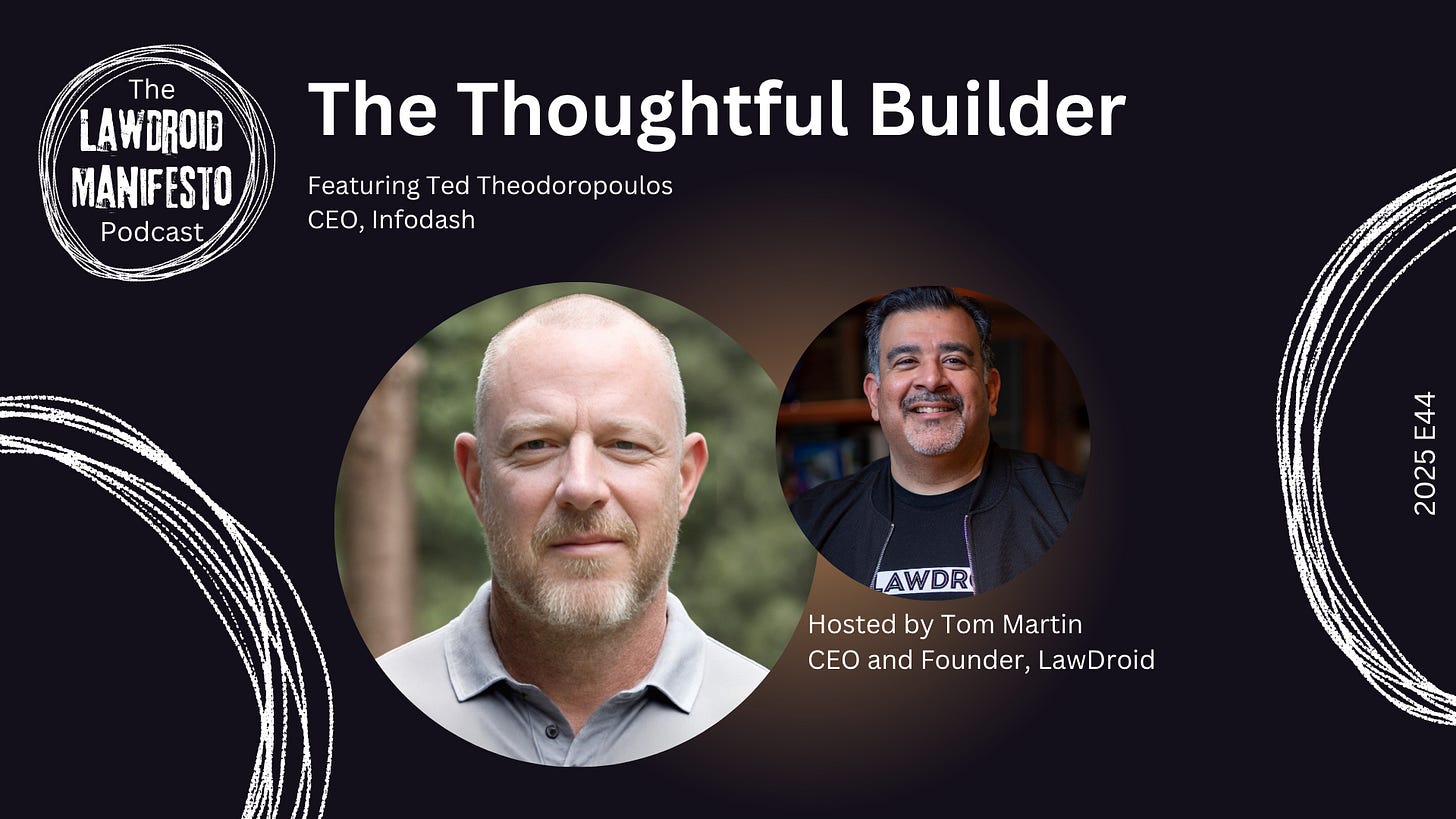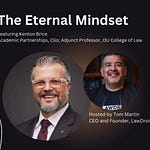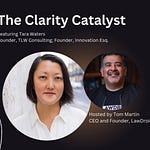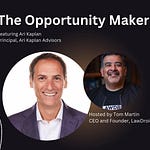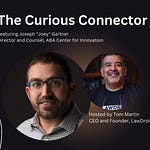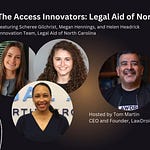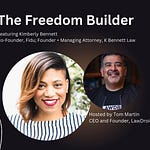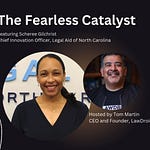Hey there Legal Rebels! 👋 I’m excited to share with you the 44th episode of the 2025 season of the LawDroid Manifesto podcast, where I will be continuing to interview key legal innovators to learn how they do what they do. I think you’re going to enjoy this one!
If you want to understand how intentional thinking and customer-first product development can transform legal technology, you need to listen to this episode. Ted is at the forefront of legal innovation, having built InfoDash into a platform that legal professionals genuinely appreciate using, and his insights on balancing entrepreneurship with meaningful work are invaluable.
Building Legal Technology That Lawyers Actually Love
Join me as I interview Ted Theodoropoulos, CEO of InfoDash and 2024 ILTA Innovative Leader of the Year.
In this insightful podcast episode, Ted shares his journey from working at Microsoft through moonlighting consulting gigs to founding Acrowire in 2008, which eventually evolved into InfoDash. He dives deep into how he’s built an intranet and extranet platform specifically designed for large law firms, focusing relentlessly on reducing friction and eliminating what he calls the “toggling tax” that costs information workers up to 9% of their time. Ted also demonstrates his unique approach to entrepreneurship, including his practice of dedicating 30 minutes each morning to pure, uninterrupted thinking time.
His stories and insights underscore his practical approach to building technology that lawyers actually want to use, from his early days of bespoke development through partnerships with Handshake to launching InfoDash as an independent platform in 2022. This episode is a must-watch for anyone interested in the intersection of product development, legal technology innovation, and maintaining meaningful work in a fast-paced entrepreneurial environment.
The Skinny
Ted Theodoropoulos, CEO of InfoDash and 2024 ILTA Innovative Leader of the Year, shares his remarkable entrepreneurial journey spanning 32 years, from his early days moonlighting while at Microsoft to building a legal technology company that prioritizes customer success above all else. Starting as Acrowire in 2008, Ted’s company focused on building bespoke intranets and extranets for law firms before partnering with Handshake in the mid-2010s and eventually launching their own solution, rebranding as InfoDash in 2022. Throughout the conversation, Ted emphasizes his commitment to reducing friction for legal professionals through integrated platforms that eliminate the “toggling tax”—the 9% of time information workers lose switching between applications. His approach to entrepreneurship includes a daily practice of 30 minutes of dedicated thinking time without phones or distractions, which has generated breakthrough insights. Ted’s motivation stems from delivering work he can be proud of, building solutions that customers genuinely appreciate, and creating a company culture where his team feels they’re making a real difference—a stark contrast to his experience in the corporate world where innovation often goes to die.
Key Takeaways:
Ted has been an entrepreneur for 32 years total, starting Acrowire in 2008 after moonlighting consulting gigs became more profitable than his Microsoft day job
InfoDash evolved from building bespoke intranets to becoming an implementation partner with Handshake, then launching their own platform in 2022
The “toggling tax” costs information workers 9% of their time (almost 4 hours per week) reorienting themselves as they switch between applications
Modern legal intranets have evolved from static information repositories to sophisticated integration hubs that create a “single pane of glass” for practice management, document management, CRM, HRIS, and experience management systems
Ted practices 30 minutes of dedicated thinking time each morning with no phone, no agenda, and no interruptions—a meditation-like process that has generated significant insights
InfoDash was recently recognized as a rising star in the Forbes Cloud 100, demonstrating the company’s rapid growth trajectory
AI and LLMs are supercharging intranet capabilities, particularly through integration hubs that power AI agents and enable natural language queries across multiple back-office systems
Ted predicts the legal market will look completely different in three to five years due to AI transformation, with firms needing to invest now in infrastructure for the transition
His motivation comes from delivering good work that customers appreciate and building a team culture where people feel they’re making a difference—something he found lacking in corporate environments
Ted’s diverse experiences include expeditions through Chile’s Atacama Desert and learning about business in Slovakia, Eastern Europe, Hong Kong, and Macau
Notable Quotes:
“We started our journey as a company called Acrowire back in 2008, and we were a consulting organization. So we did time and materials, IT work, mostly application development. And we built bespoke intranets and extranets.” - Ted Theodoropoulos (02:07-02:25)
“Harvard Business Review did a study many years ago. Actually, it was post-COVID, so four years ago-ish, and they found that 9% of information workers’ time was spent reorienting themselves as they switched from application to application. So for a 40-hour work week, that’s almost four hours a week.” - Ted Theodoropoulos (06:19-06:39)
“We have a piece of the application that’s called an integration hub. It’s an Azure service. And it is the integration layer that has tentacles in all those back-office systems. In addition to powering our front-end components, it also powers AI agents.” - Ted Theodoropoulos (07:23-07:38)
“I think in five years, the legal market is going to look completely different, possibly as soon as three, but definitely not longer than five, by my estimations anyway.” - Ted Theodoropoulos (40:54-41:02)
“I allocate 30 minutes a day during the week to thinking. And since I started that, I’ve been doing it for, I don’t know, a couple of months now. The number of insights I’ve had... Because I’m busy. I have no idle time.” - Ted Theodoropoulos (42:26-42:42)
“I get up at six, I get a cup of coffee, I go sit out while the weather’s nice. I sit out on my deck, I’ve got a heater, a little fire table, and I sit there with my cup of coffee and nobody bothers me.” - Ted Theodoropoulos (42:14-42:26)
“When I was a cog in the corporate wheel, I didn’t thrive. I actually worked my way up the ladder quite a bit, but I wasn’t happy.” - Ted Theodoropoulos (43:48-44:00)
“What really drives me now is making, and this is going to sound like I’m patting myself on the back or plugging, but it’s absolutely true, like delivering good work for customers and seeing how much they appreciate it.” - Ted Theodoropoulos (44:05-44:20)
“In legal tech, if you’ve been around for a while in legal tech, that is not the norm. Like the big companies out there that are... You know, gobble up all these other smaller innovative companies. You know, a lot of times that’s where innovation goes to die.” - Ted Theodoropoulos (44:20-44:37)
“I want to go and shake people’s hands and look them in the eye and deliver good work and then have my people feel like they’re making a difference too. And man, sometimes you don’t get that in the corporate world.” - Ted Theodoropoulos (44:55-45:10)
Clips
Buy vs. Build: Don’t Reinvent the Wheel
CoPilot is Rough and Low ROI
I Built Maersk’s $5B Billing System
I Quit After Seeing Layoffs in 2008
Ted’s journey reflects a deliberate choice to build differently in legal technology. Rather than following the typical path of rapid growth followed by acquisition and potential stagnation, he’s focused on creating sustainable value through customer success and team fulfillment. His morning thinking practice represents a counter-cultural approach in our always-connected world, yet it’s this intentional space that generates the insights driving InfoDash’s innovation.
What stands out most is Ted’s emphasis on reducing friction for legal professionals. The concept of the “toggling tax” quantifies something every lawyer experiences but rarely articulates—the cognitive load and time waste of constantly switching between systems. By creating integrated platforms that present a single pane of glass, InfoDash addresses a fundamental inefficiency in legal work.
His perspective on AI integration is particularly noteworthy. Rather than viewing AI as a separate tool, Ted sees it as naturally flowing through the same integration hub that already connects practice management, document management, and other core systems. This architectural approach positions InfoDash to leverage AI capabilities as they evolve, making the technology accessible through familiar interfaces rather than requiring lawyers to adopt entirely new workflows.
Closing Thoughts
As a legal tech entrepreneur who’s been in this space for years, I find Ted’s approach to building technology refreshingly different. He represents what I believe should be the standard in our industry—creating solutions that legal professionals genuinely appreciate using, not just tolerate because they have no other choice.
What excites me most is Ted’s commitment to doing things differently from the large legal tech companies where innovation often goes to die after acquisition. His focus on customer success, team fulfillment, and delivering work he can look people in the eye about represents a values-driven approach to entrepreneurship that our industry desperately needs more of.
The practice of dedicated thinking time particularly resonates with me. In our hyper-connected world where we’re constantly consuming podcasts, emails, and social media, the discipline to simply sit and think without agenda is revolutionary. Ted’s experience shows that this isn’t just feel-good advice—it’s a practical strategy for generating the insights that drive real innovation.
For our Legal Rebels community, Ted’s story serves as both inspiration and a practical example of sustainable entrepreneurship. You don’t need to sacrifice your values or burn out your team to build successful legal technology. In fact, as Ted demonstrates, the opposite approach—prioritizing customer success and team well-being—may be the more sustainable path to creating technology that truly transforms legal practice.
As the legal market undergoes what Ted predicts will be a dramatic transformation over the next three to five years, those who approach innovation with his combination of technical sophistication, customer focus, and human-centered values will be best positioned to thrive. The future of legal technology belongs to those who can balance the demands of entrepreneurship with the dedication to building solutions that lawyers actually love to use.



